- Clone
- MEM-166 (See other available formats)
- Regulatory Status
- RUO
- Workshop
- HCDM listed
- Other Names
- Neutrophil specific antigen 1, NB1, polycythemia rubra vera 1
- Isotype
- Mouse IgG1, κ
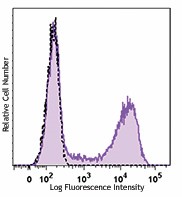
-

Human peripheral blood granulocytes were stained with CD177 (clone MEM-166) APC (filled histogram) or mouse IgG1, κ APC isotype control (open histogram).
| Cat # | Size | Price | Quantity Check Availability | ||
|---|---|---|---|---|---|
| 315807 | 25 tests | $134.00 | |||
| 315808 | 100 tests | $293.00 | |||
CD177 is also known as neutrophil specific antigen 1, NB1, and polycythemia rubra vera 1. It is a member of the uPAR family and is a GPI-linked cell surface glycoprotein with a molecular weight of 60 kD. CD177 is expressed on granulocytes and bone marrow progenitors (early erythroblasts, megakaryocytes). It is thought to be involved in allogeneic and autoimmune responses to neutrophils.
Product Details
- Verified Reactivity
- Human, Cynomolgus, Rhesus
- Antibody Type
- Monoclonal
- Host Species
- Mouse
- Immunogen
- Human granulocytes
- Formulation
- Phosphate-buffered solution, pH 7.2, containing 0.09% sodium azide and BSA (origin USA)
- Preparation
- The antibody was purified by affinity chromatography and conjugated with APC under optimal conditions.
- Concentration
- Lot-specific (to obtain lot-specific concentration and expiration, please enter the lot number in our Certificate of Analysis online tool.)
- Storage & Handling
- The antibody solution should be stored undiluted between 2°C and 8°C, and protected from prolonged exposure to light. Do not freeze.
- Application
-
FC - Quality tested
- Recommended Usage
-
Each lot of this antibody is quality control tested by immunofluorescent staining with flow cytometric analysis. For flow cytometric staining, the suggested use of this reagent is 5 µl per million cells in 100 µl staining volume or 5 µl per 100 µl of whole blood.
- Excitation Laser
-
Red Laser (633 nm)
- Application Notes
-
Additional reported applications (for the relevant formats) include: immunoprecipitation, Western blotting5, and immunofluorescence4.
-
Application References
(PubMed link indicates BioLegend citation) - Product Citations
-
- RRID
-
AB_2565213 (BioLegend Cat. No. 315807)
AB_2565213 (BioLegend Cat. No. 315808)
Antigen Details
- Structure
- uPAR family, GPI-linked cell surface glycoprotein, 60 kD
- Distribution
-
Granulocytes, bone marrow progenitors (early erythroblasts, megakaryocytes)
- Function
- Antigen involved in neutrophil allo- and autoimmunity, function unknown
- Modification
- Glycosylated
- Cell Type
- Granulocytes, Hematopoietic stem and progenitors, Neutrophils
- Biology Area
- Immunology
- Molecular Family
- CD Molecules
- Antigen References
-
1. Leukocyte Typing VII. Mason D, et al. (Eds.) Oxford University Press (2002)
2. Kissel K, et al. 2001. Eur. J. Immunol. 31:1301.
3. Lalezari P, et al. 1971. J. Clin. Invest. 50:1108.
4. Temerinac S, et al. 2000. Blood 95:2569. - Gene ID
- 57126 View all products for this Gene ID
- UniProt
- View information about CD177 on UniProt.org
Other Formats
View All CD177 Reagents Request Custom Conjugation| Description | Clone | Applications |
|---|---|---|
| Purified anti-human CD177 | MEM-166 | FC,ICC,IP,WB |
| FITC anti-human CD177 | MEM-166 | FC |
| PE anti-human CD177 | MEM-166 | FC |
| APC anti-human CD177 | MEM-166 | FC |
| APC/Cyanine7 anti-human CD177 | MEM-166 | FC |
| TotalSeq™-A0382 anti-human CD177 | MEM-166 | PG |
| TotalSeq™-C0382 anti-human CD177 | MEM-166 | PG |
| TotalSeq™-B0382 anti-human CD177 | MEM-166 | PG |
Compare Data Across All Formats
This data display is provided for general comparisons between formats.
Your actual data may vary due to variations in samples, target cells, instruments and their settings, staining conditions, and other factors.
If you need assistance with selecting the best format contact our expert technical support team.
-
Purified anti-human CD177
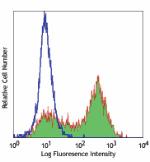
Human peripheral blood granulocytes stained with purified ME... -
FITC anti-human CD177
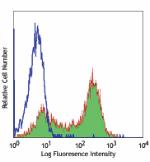
Human peripheral blood granulocytes stained with MEM-166 FIT... -
PE anti-human CD177
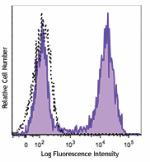
Human peripheral blood granulocytes were stained with CD177 ... -
APC anti-human CD177
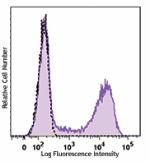
Human peripheral blood granulocytes were stained with CD177 ... -
APC/Cyanine7 anti-human CD177
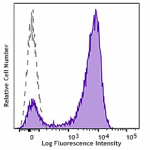
Human peripheral blood granulocytes were stained with CD177 ... -
TotalSeq™-A0382 anti-human CD177
-
TotalSeq™-C0382 anti-human CD177
-
TotalSeq™-B0382 anti-human CD177
